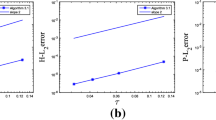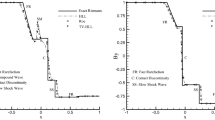Abstract
In this work, an adaptive element free Galerkin technique is presented to solve magnetohydrodynamics (MHD) equations. An a posteriori error estimation based on gradient recovery is suggested to find locations with largest error contribution. For stabilization, the MHD equations are converted into two convection diffusion equations and these equations are stabilized by adding an artificial diffusion based on local Péclet number. The presented numerical examples show efficiency of the adaptive technique.
























Similar content being viewed by others
References
Atluri S, Cho J, Kim H (1999) Analysis of thin beams, using the meshless local Petrov–Galerkin method with generalized moving least squares interpolations. Comput Mech 24:334–347
Atluri S, Zhu T (1998) A modied collocation method and a penalty formulation for enforcing the essential boundary conditions in the element free Galerkin method. Comput Mech 21:211–222
Bank R, Weiser A (1985) Some a posteriori error estimator for elliptic partial differential equations. Math Comput 44:283–301
Belytschko T, Lu Y, Gu L (1994) Element free Galerkin methods. Int J Numer Methods Eng 37:229–256
Boyd T, Sanderson J (2003) The physics of plasmas. Cambridge University Press, Cambridge
Burman E, Hansbo P (2004) Edge stabilization for Galerkin approximations of convection–diffusion–reaction problems. Comput Methods Appl Mech Eng 193:1437–1453
Ciarlet P (1978) The finite element method for elliptic problems. North-Holland, Amsterdam
Cavoretto R, De Rossi A (2019) Adaptive meshless refinement schemes for RBF-PUM collocation. Appl Math Lett 90:131–138
Cavoretto R, De Rossi A (2020) A two-stage adaptive scheme based on RBF collocation for solving elliptic PDEs. Comoput Math Appl. https://doi.org/10.1016/j.camwa.2020.01.018
Cavoretto R, De Rossi A (2020) An adaptive LOOCV-based refinement scheme for RBF collocation methods over irregular domains. Appl Math Lett. https://doi.org/10.1016/j.aml.2019.106178
Chung H, Belytschko T (1998) An error estimate in the EFG method. Comput Mech 21:91–100
Dehghan M, Abbaszadeh M (2018) A reduced proper orthogonal decomposition (POD) element free Galerkin (POD-EFG) method to simulate two dimensional solute transport problems and error estimate. Appl Numer Math 126:92–112
Dehghan M, Abbaszadeh M (2016) Proper orthogonal decomposition variational multiscale element free Galerkin (POD-VMEFG) meshless method for solving incompressible Navier–Stokes equation. Comput Methods Appl Mech Eng 311:856–888
Dehghan M, Abbaszadeh M (2019) Error analysis and numerical simulation of magnetohydrodynamics (MHD) equation based on the interpolating element free Galerkin (IEFG) method. Appl Numer Math 137:252–273
Dehghan M, Salehi M (2013) A meshfree weak-strong (MWS) form method for the unsteady magnetohydrodynamic (MHD) ow in pipe with arbitrary wall conductivity. Comput Mech 52:1445–1462
Dehgghan M, Mohammadi V (2015) The method of variably scaled radial kernels for solving two-dimensional magnetohydrodynamic (MHD) equations using two discretizations: The Crank-Nicolson scheme and the method of lines (MOL). Comput Math Appl 70:2292–2315
Dehghan M, Haghjoo-Saniji M (2017) The local radial point interpolation meshless method for solving Maxwell equations. Eng Comput 33:897–918
Demendy Z, Nagy T (1997) A new algorithm for solution of equations of MHD channel flows at moderate Hartmann numbers. Acta Mech 123:135–149
Dolbow J, Belytschko T (1999) Numerical integration of the Galerkin weak form in meshfree methods. Comput Mech 23:219–230
Dolbow J, Belytschko T (1998) An introduction to programming the meshless element free Galerkin method. Comput Methods Eng 5(3):207–241
Eriksson K, Estep D, Hansbo P, Johnson C (1995) Introduction to adaptive methods for differential equations. Acta Numer 4:105–158
Fu P, Li F, Xu Y (2018) Globally divergence-free discontinuous Galerkin methods for ideal magnetohydrodynamic equations. J Sci Comput 77(3):1621–1659
Gockenbach M (2006) Understanding and implementing the finite element method. SIAM, Philadelphia
Gratsch T, Bathe K (2005) A posteriori error estimation techniques in practical finite element analysis. Comput Struct 83:235–265
Guillet T, Pakmor R, Springel V, Chandrashekar P, Klingenberg C. High-order magnetohydrodynamics for astrophysics with an adaptive mesh refinement discontinuous Galerkin scheme. arXiv:1806.02343
Hartmann J, Lazarus F (1937) Experimental investigations on the flow of mercury in a homogeneous magnetic field. K Dan Vidensk Selsk Mat Fys Medd 15(6):1–45
Hosseinzadeh H, Dehghan M, Mirzaei D (2013) The boundary elements method for magneto-hydrodynamic (MHD) channel flows at high Hartmann numbers. Appl Math Model 37:2337–2351
Hsieh P, Yang S (2009) A bubble-stabilized least-squares finite element method for steady MHD duct flow problems at high Hartmann numbers. J Comput Phys 228:8301–8320
John V (2000) A numerical study of a posteriori error estimators for convection–diffusion equations. Comput Methods Appl Mech Eng 190:757–781
Kamranian M, Dehghan M, Tatari M (2017) An adaptive meshless local Petrov–Galerkin method based on a posteriori error estimation for the boundary layer problems. Appl Numer Math 111:181–196
Lancaster P, Salkauskas K (1981) Surface generated by moving least squares methods. Math Comput 37:141–158
Lankalapalli S, Flaherty J, Shephard M, Strauss H (2007) An adaptive finite element method for magnetohydrodynamics. J Comput Phys 225(1):363–381
Larson M, Bengzon F (2013) The finite element method, theory, implementation and applications. Springer, Berlin
Li X (2018) Three-dimensional complex variable element-free Galerkin method. Appl Math Model 63:148–171
Nguyen V, Rabczuk T, Bordas S, Duflot M (2008) Meshless methods: a review and computer implementation aspects. Math Comput Simul 79(3):763–813
Shakeri F, Dehghan M (2011) A nite volume spectral element method for solving magnetohydrodynamic (MHD) equations. Appl Numer Math 61:1–23
Shercliff J (1953) Steady motion of conducting fluids in pipes under the action of transverse magnetic field. Math Proc Camb Philos Soc 49(1):136–144
Shercliff J (1962) Magnetohydrodynamics pipe flow part II, high Hartmaan number. J Fluid Mech 13(4):513–518
Schnack D, Lottati I, Mikic Z, Satyanarayana P (1998) A finite-volume algorithm for three dimensional magnetohydrodynamics on an unstructured, adaptive grid in axially symmetric geometry. J Comput Phys 140:71–121
Strauss H, Longcope D (1998) An adaptive finite element method for magnetohydrodynamics. J Comput Phys 147:318–336
Tatari M, Ghasemi F (2014) The Galerkin boundary node method for magneto-hydrodynamic (MHD) equation. J Comput Phys 258:634–649
Verardi S, Machado J, Shiyou Y (2003) The application of interpolating MLS approximations to the analysis of MHD flows. Finite Elem Anal Des 39(12):1173–1187
Yaw L (2009) Introduction to moving least squares (MLS) shape functions. Walla Walla University, Washington
Zhang L, Ouyang J, Zhang X (2008) The two-level element free Galerkin method for MHD flow at high Hartmann numbers. Phys Lett 372:5625–5638
Zienkiewicz O, Zhu J (1992) The superconvergent path recovery and a posteriori error estimation. Part \(1\): the recovery technique. Int J Numer Methods Eng 33:1365–1382
Acknowledgements
The authors are very grateful to reviewers for carefully reading the paper and for their constructive comments and suggestions.
Author information
Authors and Affiliations
Corresponding author
Additional information
Publisher's Note
Springer Nature remains neutral with regard to jurisdictional claims in published maps and institutional affiliations.
Rights and permissions
About this article
Cite this article
Jannesari, Z., Tatari, M. Magnetohydrodynamics (MHD) simulation via an adaptive element free Galerkin method. Engineering with Computers 38, 679–693 (2022). https://doi.org/10.1007/s00366-020-01079-8
Received:
Accepted:
Published:
Issue Date:
DOI: https://doi.org/10.1007/s00366-020-01079-8




